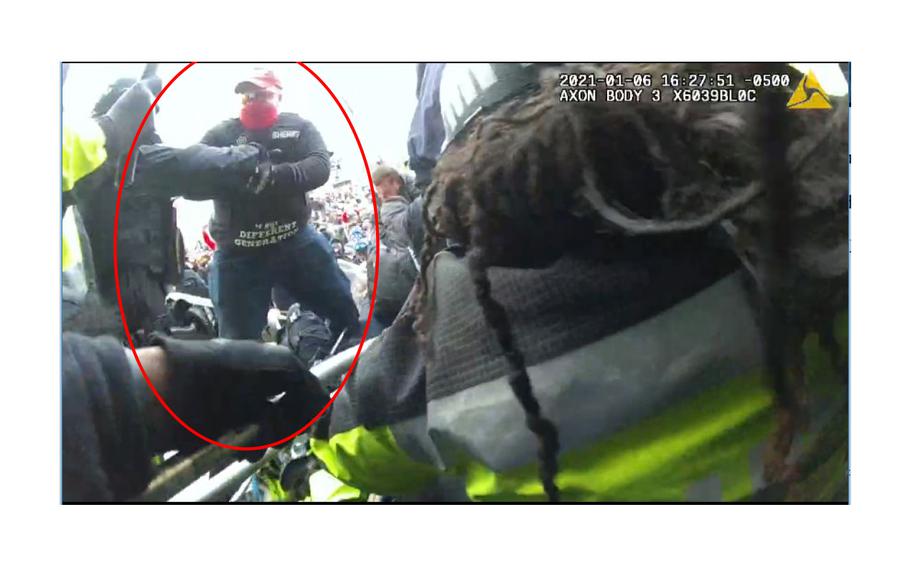
A screen grab from body-camera video shows Ronald McAbee, in a red circle added by investigators, during an assault on D.C. police officer Andrew Wayte at the Capitol on Jan. 6, 2021. (U.S. Attorney’s Office for the District of Columbia)
An off-duty Tennessee sheriff’s deputy who claimed he was helping police was sentenced Wednesday to nearly six years in prison for aggravated assaults against two officers in one of the most violent areas of the Jan. 6, 2021, U.S. Capitol riot.
Ronald McAbee, 30, struck D.C. police officer Carter Moore twice in the face while wearing hard-knuckle gloves and a bulletproof vest with two patches that read “SHERIFF” and “III” (for the Three Percenters right-wing, anti-government movement).
Moore was trying to help a fallen D.C. police officer, Andrew Wayte, after a third officer had been dragged down the steps and beaten at the entrance of a bloodily fought-over tunnel at the Lower West Terrace at about 4:30 p.m. Video showed that McAbee, another rioter and police then grabbed hold of Wayte and began pulling in different directions “in a violent tug-of-war with Wayte’s defenseless body as the rope,” U.S. District Judge Rudy Contreras said at McAbee’s sentencing hearing in D.C.
McAbee fell on Wayte as they slid down the steps in front of the tunnel archway, pinning him for about 25 seconds while rioters pulled off Wayte’s gas mask and hit his face with a chemical spray.
“It was an aggravated assault in every sense,” Contreras said at the hearing. “You lost your cool that day,” he told McAbee, adding, “I take attacks on law enforcement very, very seriously, as I suspect you did too before that day.”
The hand-to-hand combat at the tunnel entrance was one of the most violent moments of the hours-long riot at the Capitol, where enraged supporters sent by President Donald Trump and inflamed by his false claim that the 2020 election had been stolen injured more than 100 officers and caused more than $3 million in damage.
McAbee testified at trial that he was trying to protect Wayte and alert police to the body of an unconscious protester, Rosanne Boyland, 34, who died of what was determined to be amphetamine intoxication.
McAbee said he never intended to “strike fear or cause chaos” on Jan. 6 and apologized to police, saying he now understood officers’ frame of mind: “They had a job to do” and he was “in the way.”
“I wish they were here so I can tell them I’m sorry,” McAbee said of the two officers. “I’m sorry for all the families that lost someone,” he added, naming Boyland, other members of the public, and police who died or killed themselves on or after the Jan. 6 attack.
McAbee, who has worked as a sheriff’s deputy or corrections officer for five departments in Tennessee and northern Georgia, said he has nightmares about what he could have done differently and expressed particular remorse to Boyland’s parents that he could not save her, after trying to perform CPR following his fight with police.
Assistant federal defender Benjamin Schiffelbein urged leniency, citing McAbee’s good character, law enforcement work, recovery from emotional and physical abuse as a child, and the point that he did not abuse the fact that he was a police officer during the Capitol attack.
“Harsh sentences don’t deter mobs,” Schiffelbein said. “Recognizing the humanity of people who attempted the January 6th insurrection is the way to prevent it in the future.”
Contreras said McAbee came armed to Washington saying he was ready to fight for children and future generations, suggesting he was not thinking about self-defense from counterprotesters, and posed for a photograph the following day holding a newspaper with the headline “INSURRECTION.”
And while McAbee and others helped pass Boyland’s lifeless body back through the tunnel behind police lines to receive medical assistance, Contreras said, “No other rioter who assisted Boyland needed to attack police officers.” The judge said the violence “hindered their ability to do anything other than hold the tunnel and defend themselves.”
McAbee pleaded guilty in September to assaulting Moore and was convicted after trial in October of Wayte’s assault. He was sentenced on all seven counts charged by prosecutors including felony rioting and trespassing on restricted Capitol grounds with a deadly or dangerous weapon (his reinforced gloves).
Prosecutor Benet J. Kearney asked for a 12 ½-year sentence, saying McAbee was a law enforcement officer who “chose to break the law” by harming officers trying to protect the Capitol and Congress from “an armed, angry crowd of rioters.”
McAbee will be credited with 31 months he has been jailed pending trial, and Contreras agreed with a defense request to seek his designation to a minimum security federal prison facility in Englewood, Colo., known for holding convicted former police officers. Contreras ordered McAbee to pay along with two co-defendants $30,165.65 in restitution to the D.C. police department for Wayte’s medical treatment and the six months he spent recuperating from his injuries while out of or on limited duty.